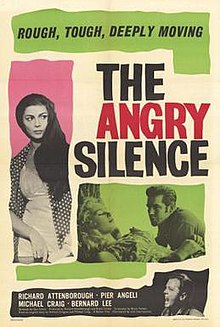

| The Angry Silence | |
|---|---|
 | |
| Directed by | Guy Green |
| Screenplay by | Bryan Forbes |
| Story by | Richard Gregson Michael Craig |
| Produced by | Richard Attenborough Bryan Forbes Jack Rix |
| Starring | Richard Attenborough Pier Angeli Michael Craig Bernard Lee |
| Cinematography | Arthur Ibbetson |
| Edited by | Anthony Harvey |
| Music by | Malcolm Arnold |
Production | Beaver Films |
| Distributed by | British Lion Film Corporation |
Release date |
|
Running time | 95 minutes |
| Country | United Kingdom |
| Language | English |
| Budget | £97,000[1][2] |
The Angry Silence is a 1960 black-and-white British drama film directed by Guy Green and starring Richard Attenborough, Pier Angeli, Michael Craig and Bernard Lee.[3]
The film marked the first release through screenwriter Bryan Forbes's production venture, Beaver Films, and Forbes won a BAFTA Award and an Oscar nomination for his contribution (shared with original story writers Michael Craig and Richard Gregson).[4] Green called it a "landmark" in his career.[5]
Factory worker Tom Curtis has two children and his wife, Anna, is pregnant, putting him under financial pressure. Consequently, he refuses to take part in an unofficial strike, meaning a loss of wages, which he is entitled to do. The strike is planned by outside activist Travers and orchestrated by shop steward Bert Connolly, who concocts spurious demands as part of his campaign to pressure the management into agreeing to a closed shop, giving the union greater influence.
Those who continue to work find that their properties are subject to repeated attacks, including bricks through windows and arson, and join the strike out of fear. Curtis alone continues to work in a show of defiance against threats and intimidation.
When the strike ends, Curtis is accused of being a scab and sent to Coventry.[6] Then, when anti-union newspapers interview him and report on his plight, Connolly demands his dismissal, backing his demand with a work to rule and overtime ban. Management fears that continued publicity will mean the loss of a major contract, while some workers take matters into their own hands.
Kenneth More was initially considered for the role of Tom Curtis but turned it down when offered the lead in Sink the Bismarck!.[7][8]
Guy Green said "we all felt very noble" not accepting full pay but says the film was excellent for his career.[5]
The film received positive reviews in the UK and US. Variety wrote that Guy Green had directed with 'quiet skill, leaving the film to speak for itself'. The film was entered into the 10th Berlin International Film Festival.[9]
By 1971 the film made an estimated profit of £58,000.[1] In 1997 Bryan Forbes estimated the profit at £200,000.[2]
After the film's release Richard Attenborough visited a working men's clubinAberdare, South Wales, that was refusing to show the film. Many such clubs had banned the film because of its anti-strike plot. However, after Attenborough explained his position on the film, the miners allowed it to be screened. This was important because, during the 1960s, films required such showings to drive ticket sales.[4]
Some critics have raised doubts about the politics of the film, particularly with regard to trivialisation of the needs and demands of the workers.[10] Others suggest that the film is also a reflection of British working-class values at the time, such as 'an Englishman's home is his castle'.[11]
OnRotten Tomatoes the film has a rating of 80%, based on reviews from five critics.[12]
|
The films of Guy Green
| |
|---|---|
|